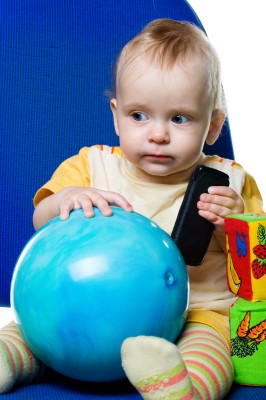If you are a new mother, you may be wondering what kinds of toys and learning devices will give your baby just the right amount of stimulation and what products will be overkill. Are you over-stimulating your baby? The National Research Council has set forth research which shows the importance of stimulation on a baby’s development (social, cognitive, physical, and emotional stimulation). Studies have shown that extreme sensory deprivation and a lack of stimulation can have severe consequences on child development. However, even though stimulation is a good – too much stimulation can be a bad thing. As mothers, we want to be loved and accepted by our babies and we want to provide them with an abundance of learning opportunities – and as a result, we may provide them with too much stimulation at times.
Every baby is different; therefore you must consider your baby’s unique personality and temperament and be sensitive to your infant’s individual needs. Different babies can tolerate different levels of stimulation – so it is crucial to pay close attention to your own baby’s needs. For instance, some babies will be over-stimulated with music and mobiles in their cribs, while other babies may be soothed by them. Once you tune into your baby, you will be able to provide her with just the right amount of stimulation.
Signs that your baby may be overstimulated:
- Your baby looks away as you make sounds
- Your baby looks away when you try to make eye contact with her
- Your baby rubs her eyes and appears to be tired
What to do when you see signs of overstimulation:
- Provide your baby with space and quiet time
- Try using only 1 stimulus at a time (for example, make soothing sounds or touch, but do not do both simultaneously)
With the aim of providing babies with more learning opportunities, some parents purchase vocabulary DVDs. However, Doctor Dimitri Christakis demonstrated that babies are over-stimulated while watching these educational programs on television, DVDs, and videos, and that watching these things as babies has a detrimental effect on language development. According to studies conducted by Christakis, overstimulation results in babies learning fewer vocabulary words and having lower scores on language skills tests (10% lower than babies who have never watched television learning programs). Christakis claims that he witnessed the most damaging effects on language development in eight to sixteen month old babies. The most important learning experiences a baby can have are the result of face-to-face interactions with caregivers – not from DVDs. Studies have shown that face-to-face interactions with babies make them learn faster than they could ever learn by looking at a person speaking on a television screen. Learning programs on television have quick edits, and do not resemble the type of speaking parents use when they engage their infants in activities. Television and high tech baby learning products may over-stimulate your baby and detract from their learning.
We can provide babies with sensory stimulation in the following ways:
- Tasting and sampling different foods
- Listening to music, voices, and the sound of mother’s heartbeat
- Experiencing motion, such as rocking or swinging
- Looking at different objects and people
- Touching objects with interesting textures
- Smelling different things
- Holding your baby in your arms
- Swaddling
- Breastfeeding
There is a very thin line between stimulating a baby and engaging her curiosity, and over-stimulating her. Parents should provide infants with opportunities to explore their environment and learn about the world around them, but at the same time they must protect their babies from overstimulation. In order to do this, we must learn how to read our baby’s cues – this will enable us to know when our baby is interested in an activity, and when our baby is over-stimulated and craves her quiet time.
About the author:
Jacqueline Shaprow is an attorney, author, and graduate of Yale. She is a President and Founder of THE BABY SHOWER FOUNDATION, an organization that celebrates homeless and low-income women’s pregnancies with Baby Shower events. This organization provides these women with high quality baby care products and education so that they will feel prepared for motherhood. She has published motherhood articles and taught a course at a homeless shelter for pregnant women in Los Angeles that was featured on an ABC network television show. You can check out her foundation at http://showerfoundation.org/
photo: copyright 123RF.com

